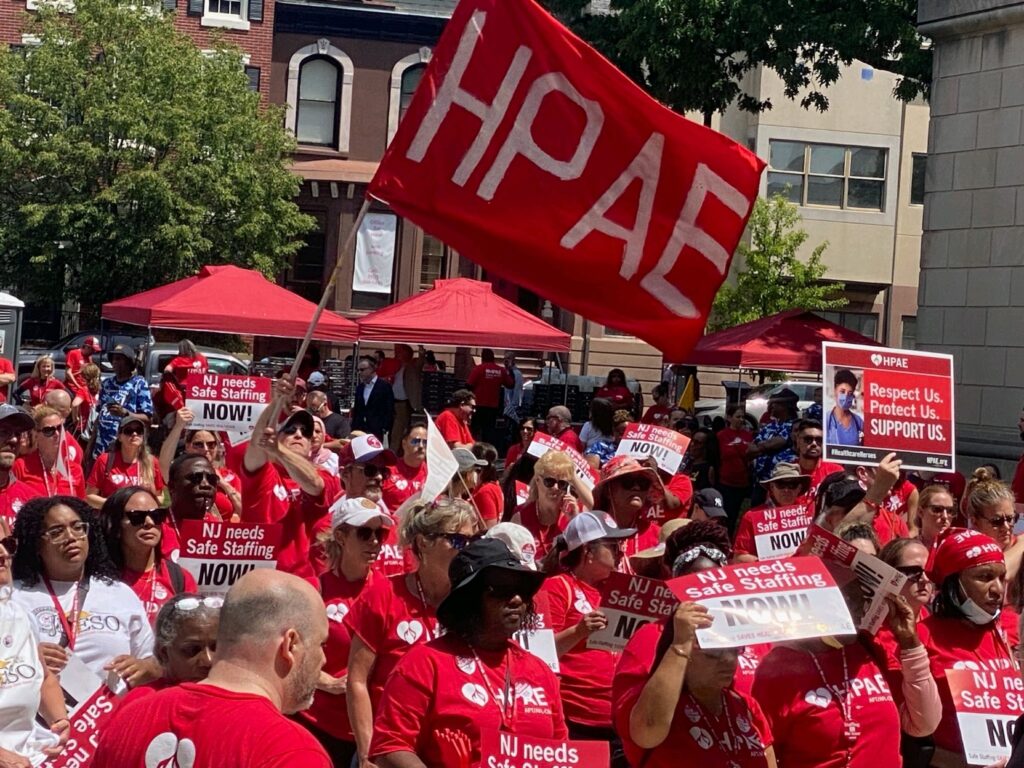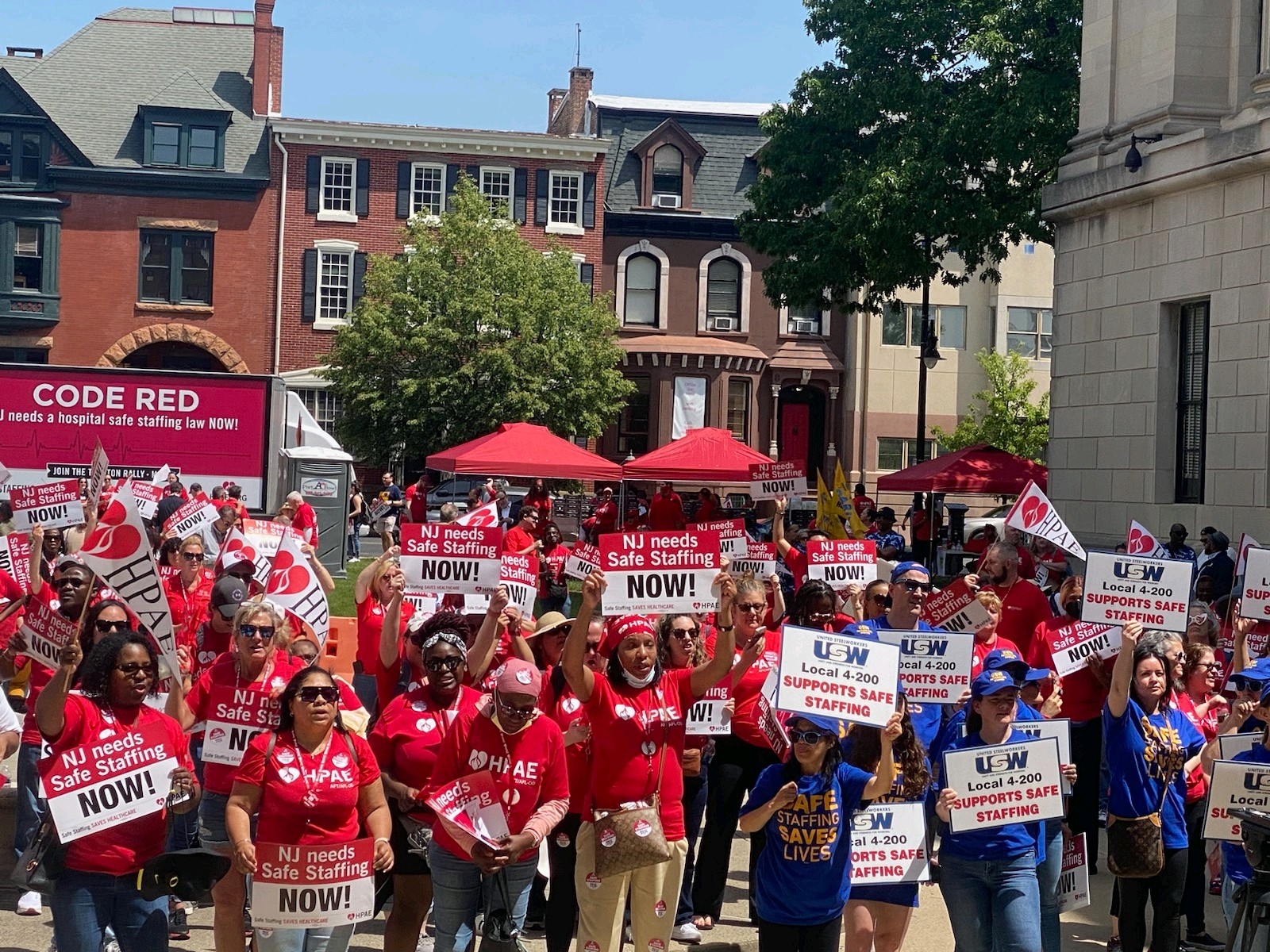NJ Nurses Safe Staffing Drive Picks up Momentum

On May 11, the day President Biden declared an end to the COVID emergency, hundreds of nurses were in Trenton demanding enactment of nurse-to-patient staffing ratios as was done in California in 2004 which studies have documented greatly improved patient outcomes, workplace safety, infection control and nurse retention.
The chants of the large boisterous crowd, which included rank and file nurses from all of the state’s four nurses’ unions, echoed through the streets of downtown Trenton at lunchtime. “Safe staffing saves lives, safe staffing saves lives, safe staffing saves lives,” the throng thundered.
The renewed push for the staffing requirements comes as a national survey predicted New Jersey would be shy 11,400 nurses by 2030, ranking it in the top ten state with a severe shortfall. Also, in that crisis mix Connecticut (27,926), New York (18,784), and Pennsylvania (16,430).
According to an investigation by the Guardian Newspapers and Kaiser Health News, well over 700 healthcare workers died in the first wave of the COVID pandemic from New Jersey and New York which came amidst a national shortage of N-95 masks. Nationally, over 3,600 healthcare workers perished in the first year of the pandemic. Close to two-thirds of them were people of color.
“I stand with all of you today to join you in the sounding the alarm that there is a crisis brewing in our healthcare system,” Senator Linda Greenstein (D-14-Dist), the prime sponsor of the staffing ratio bill told the crowd. “After the last three years of battling a global pandemic there are lessons learned. The especially important lesson is that we must do more to reduce the risk of harm to patients.”
Greenstein continued. “We need to establish standards that will improve working conditions at our hospitals. One piece of that puzzle is safe staffing, making sure that are hospitals and healthcare facilities are properly staffed means that the staff will be well equipped to provide exceptional care and ultimately to save lives.”
Greenstein’s bill S304 would include requiring a nurse for every five patients on a medical/surgical unit, a nurse for every four patients in a pediatric or intermediate-care nursery unit, as well as one for every six patients in a well-baby nursery. In addition to covering hospitals, the measure would include surgical facilities, developmental centers as well as psychiatric hospitals.
Debbie White, an RN and president of Health Professionals and Allied Employees, New Jersey’s largest healthcare union, cited peer reviewed research that tracked the results of California’s adoption of nurse-to-patient staffing ratio standard almost twenty years ago.

“They found this that for patients—a decreased likelihood of patient death-decreased admittance to critical care-improved patient outcomes-improved patient satisfaction-less hospital acquired infections, decreased patient readmissions and one of my personal favorites, less workplace violence,” White told the crowd. “Healthcare workers are five times more likely to be assaulted than any other profession. If healthcare workers are safe, patients are safe.”
White continued. “Safe staffing not only makes patients and healthcare workers safer, it causes better retention of staff. Less turnover, which mean less orientation costs, because you know there’s a revolving door---they come in the leave-they come in-they leave—and better outcomes lead to better CMS [Centers for Medicare & Medicaid Services] reimbursement, less lawsuits---safe staffing saves money.”
According to HPAE, a third of New Jersey’s nurses working directly with patients in the hospital setting have left the profession in the last three years. In that same survey of its members, the union found that close to three quarters of hospital nurses polled had considered leaving in recent years with newer hires more likely to exit. Short staffing, burnout and job-related stress were the most common complaints.
"Our nurses are the backbone of our healthcare system. But current staffing levels are threatening our healthcare system's ability to provide the level of care we need, and it is taking its toll on already strained healthcare workers,” declared New Jersey State AFL-CIO Secretary-Treasurer Laurel Brennan. “Unfortunately, some hospitals are opposed to improving staffing ratios because they are choosing to prioritize profits, even as we reach a post-pandemic healthcare staffing crisis point.”
The renewed push for safe staffing legislation has the support from JNESO District Council 1 IUOE-AFL-CIO, 1199J AFSCME, United Steel Workers Local 4-200, and Shore Nurses Union/NYSNA which all turned out members last week.
Maura Collinsgru, a patient advocate and the director of policy and advocacy for Citizens Action, told the crowd that packed the Capitol Annex that anyone who ever had a relative in the hospital knew first-hand the critical role played by nurses in patient recovery.
“When you get to a hospital bed, they tell you there is a little button on your bed and that doesn’t call the doctor or the hospital administrator or somebody on Wall Street,” Collingsgru said. “That calls the nurse and it’s because of the quality of nursing that patients receive that determines whether or not they do well or not in that hospital and any patient that’s been in a hospital will tell you that.”
Collingsgru continued. “We need political leadership. We need to put patients above profits, and we need to stop bowing to the whims of hospital corporations. We need patients and nurses first. Safe staffing now. Let’s get it done.”
Several state legislators turned out to express their support.
“I know you hear this all the time—is there anything more important when someone is challenged with a health issue that they get proper care,” said Senator Patrick Diegnan (D-18 Dist.). “What you are doing here today is just simply common sense. Keep up the good work.”
At the rally the nurses got enthusiastic support from two veteran legislators who had careers in law enforcement who married nurses.
“I was a former Trooper, and we were always concerned about our safety when we walked on the streets,” explained Sen. Fred Madden D-4th Dist.). “We wore vests we had different ways and tactics to handle our job so to speak. You do the same thing. I think it is extremely important that the legislators understand we need to support you from a safety perspective.”
Madden observed that while there were hospital executives “making beaucoup bucks” even as the industry reflexively pushed back against being held to staffing standards. “We always hear about what it would cost to make sure that our healthcare workers are safe…. That’s not the way to address it.”
“I have at home an attached garage that’s attached to my house, so its kind of warm in winter and its cool in summer. If I didn’t support this bill, I’d be in the garage,” said Sen Gordon Johnson (D-37th Dist.) whose wife has been a nurse for a number of years. “You got our full attention on this so let’s go forward on this and keep in the house, not the garage.”
“Enough is enough. How many more nurses do we need to lose from the bedside because they are overworked and stretched to their limits,” said Elfrieda Johnson, president of JNESO District Council 1 IUOE-AFL-CIO. “How many patients should be put at increased risk because there simply aren’t enough nurses to care for them…. Patients deserve more and we need to stop the hemorrhaging of an already devastated workforce.”
In an interview with InsiderNJ, Johnson said that long before COVID, which killed 1.1 million Americans, including over 35,000 in New Jersey, infection control had been a serious issue linked to staffing.
“It’s not a new issue but it is a critical issue because if you don’t have enough staff, you can’t do the things you want to do at the time they should be done, Johnson said. “They will get done but it’s not the way it should be done and it’s not in the time it should be done. It’s about getting things done in a timely manner the way it should be done that includes giving the medication on time, changing the dressings on time, keeping the patients clean on time—all of that is part of safe staffing.”
In its public statements about the staffing crisis, the New Jersey Hospital Association has maintained sthe state needed “to expand the healthcare workforce pipeline.”
“To start, New Jersey can expand training programs. New Jersey nursing programs are actually turning away qualified applicants because we don’t have enough instructors or physical space to train interested students,” said NJHA CEO Cathy Bennett, in a statement. “NJHA is partnering with policymakers to develop additional clinical sites, recruit more healthcare faculty and update curricula as healthcare delivery evolves and patients’ needs change.”





